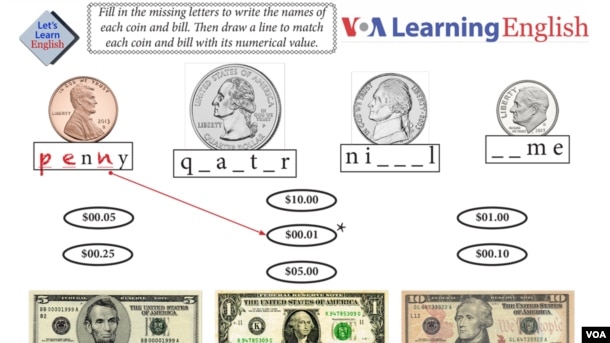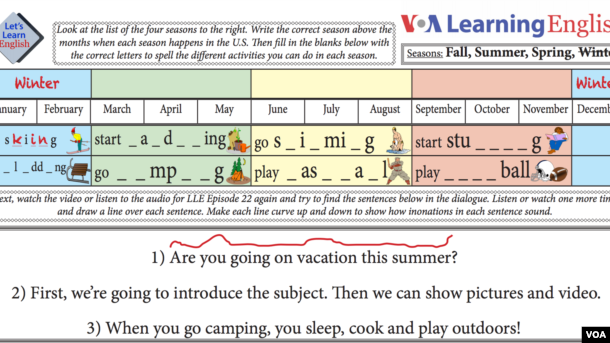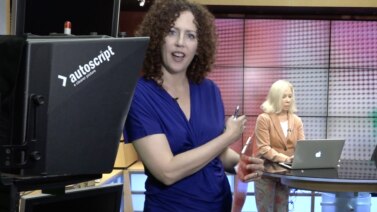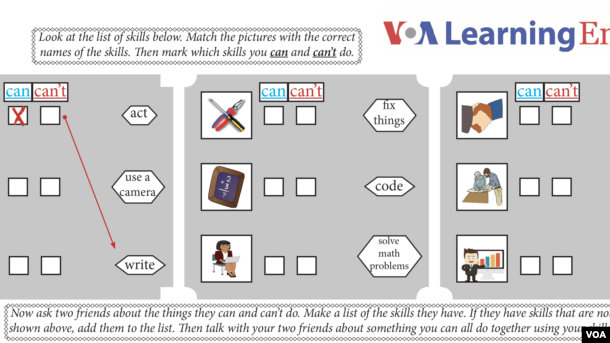Summary
Anna and her boss go on a trip around the world. That is, they eat foods from around the world. What will they find?Speaking
In this video, you can practice saying the new words and learn about counting when you give someone change.Pronunciation
In this video, you can learn about three informal English expressions: outta, yep, and whaddaya.
Anna: Washington, D.C. has great food from all over the world.
Anna: Today I’m having lunch with my boss. Ms. Weaver says we’re going on a trip around the world. But she knows I only have an hour for lunch! Silly woman.
Jonathan: Hi, Anna!
Anna: Hi Jonathan! Hey, we are meeting Ms. Weaver for lunch at noon, aren’t we?
Jonathan: Yes.
Anna: What time is it now?
Jonathan: 11:50.
Anna: 11:50! We have to go!
Anna: So, where is this world food restaurant?
Caty: We’re not eating at a restaurant.
Anna: Where are we eating?
Caty: We are eating at ... food trucks!
Anna: Food trucks … awesome! What’s a food truck?
Caty: These are food trucks!
Anna: Wow!
Jonathan: Whoa!
Caty: Okay, Jonathan, you will buy the first dish. Here is $10. Surprise us!
Jonathan: Okay, I’ll be back in 15 minutes.
Anna: What country do I want to visit?
Caty: Anna, you pick the second country. Here is $10.
Anna: I want chicken.
Caty: The food truck, over there, has great chicken.
Anna: Awesome!
Caty: After you buy your food, meet me here.
Jonathan: Excuse me, I’ll have the shrimp.
Jonathan: Oh, you’re out of shrimp. Okay, I’ll have the beef then.
Anna: Hello. I want the chicken dish.
Truck worker: We're out of chicken.
Anna: You're out of chicken.
Worker: Yep.
Anna: I’ll try another food truck. Thanks!
Worker: You're welcome.
Jonathan: Okay, here is your change. The dish is $7. So, here is 1, 2, 3 dollars back from your 10.
Caty: Great.
Jonathan: Where’s Anna? Is she dancing by that food truck?
Caty: Yes. Yes, she is.
Anna: Ms. Weaver, here is your change. The dish costs $5. So - $5 back.
Caty: Thanks, Anna. But where is the food?
Anna: I’m eating it. The Peruvian chicken is delicious! Try some!
(Caty and Jonathan shake their heads “no”)
Caty: Well, we still have $8! What do you want now?
Anna: We can buy dessert!
Caty: I’ll buy dessert.
Anna: In Washington, D.C., you can travel around the world … with food trucks! And it does not cost a lot.
Anna: Until next time!
Writing
Anna and her co-workers are going out for lunch together. What do you usually have for lunch on a weekday? Describe it and send us a photo if you can! Send us an email or write in the Comments section.Use the Activity Sheet to practice writing and talking about money and change.

Lesson 23 Activity Sheet
Learning Strategy
Learning Strategies are the thoughts and actions that help make learning easier or more effective.The learning strategy for this lesson is Respond. In many everyday situations, we have to respond to what we hear. Speaking English as a second language might make it hard for you to respond quickly. The strategy respond is part of listening actively. After listening to what the other person says, you respond on the same topic.


